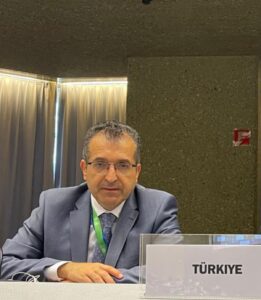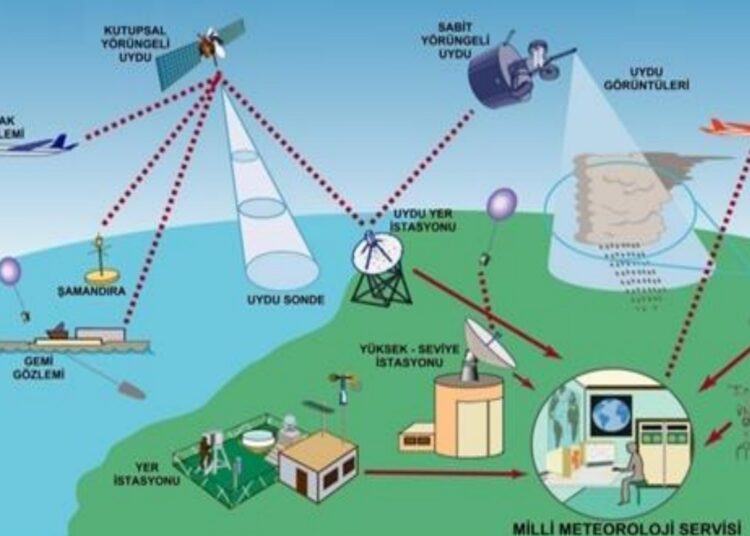Abdullah Bozkurt/Stockholm
According to a government report released in November 2023, Turkey’s national weather agency has been supplying Iran with sophisticated weather information that can be tailored for military operations for several years, a situation that poses a significant threat given the mullah regime’s known sponsorship of global terrorism.
Interestingly, the agency, officially known as Meteoroloji Genel Müdürlüğü (General Directorate for Meteorology, MGM), has been supplying the same data to NATO allies Germany, the UK and Italy and the NATO European Command in Belgium, officially known as the Supreme Headquarters Allied Powers Europe (SHAPE), both of which have the same level of access to MGM servers as Iran. The Turkish Armed Forces has also the same access as all the others.
The report, titled “2024-2028 Strategic Plan,” noted that despite varying demands from civilian and military clients, the agency has been providing same data for both clients. It described this situation as a risk that the agency must address in the future, although it did not specify the measures required to rectify the issue.
A slide from an MGM presentation reveals that Iran has access to the same servers as Turkey’s weather service, MGM, alongside NATO allies:
There is concern that Iran could leverage sophisticated data acquired from the MGM servers for military operations and clandestine activities across the Middle East.
Furthermore, the MGM has been providing technical, consulting and training services to Iran through multiple agreements executed by the government of President Recep Tayyip Erdogan in recent years. As a result Iran has gained access to sophisticated dual-use technology, equipment and expertise via the agency’s Calibration Center for Meteorologic Instruments (Meteorolojik Aletler Kalibrasyon Merkezi).
The extent to which Iran has utilized MGM’s hardware and expertise in the past, and whether it has used this capability for military purposes, remains unknown to the public due to the confidentiality surrounding the orders placed with the MGM by Iran.

In addition to dozens of bilateral agreements signed between Iran and Turkey over the last decade, the mullah regime also utilizes regional group the Economic Cooperation Organization (ECO) — a creation of Erdoğan’s Islamist mentor, Necmettin Erbakan, a former prime minister who strengthened ties with Iran — as a key instrument for accessing know-how and critical information from Turkey.
The MGM operates a vast network of over 2,000 observation points to collect weather data across land, sea and air, amassing extensive information with both civilian and military applications. Additionally, the agency offers fundamental courses in meteorology and the use of data and radar systems for officers and non-commissioned officers at the Turkish Armed Forces’ Command for Intelligence School (TSK İstihbarat Okul Komutanlığı).
The Erdogan government’s pro-Iran stance has caused Turkey to deviate from the Western bloc on numerous issues over the past decade. During Erdogan’s visit to Tehran in 2014, he said, “Iran feels like a second home,” reflecting his strong affinity for the Islamist regime in Iran.
This affinity is driven not only by ideological commitment to Islamism but also by involvement in illegal and profitable business schemes. His covert dealings with Iran came to light during graft probes in 2013, which revealed how Erdogan and his associates accepted substantial bribes from an Iranian operative named Reza Zarrab, who used Turkey’s state-owned Halkbank to launder Iranian government funds, aiming to circumvent US sanctions.
An excerpt from the strategic MGM report highlights that Turkey’s weather service provides the same access to both civilian and military clients and categorizes this practice as a risk:
Key positions around Erdogan are predominantly staffed by political Islamist individuals who were influenced in their youth by fantasies of the Iranian revolution. For instance İbrahim Kalın, the head of Turkish intelligence agency MIT, is known to be a strong admirer and sympathizer of Iran’s mullah regime. Foreign Minister Hakan Fidan was active in pro-Iran Shiite circles during his youth and established connections with numerous Iranian operatives, some of whom were later convicted on terrorism charges. He was identified as a trusted individual in seized intelligence documents obtained from an Iranian-Turkish operative in 2011.
Sefer Turan, Erdogan’s chief foreign policy advisor for Muslim and Arab states, had previously worked for an Iranian-funded magazine that was subsequently closed down on terrorism charges. Turan is known for having defended Iran and its militant proxies in his writing, advocating for positions that included calls for the destruction of Israel.
Turkey has become a crucial gateway for Iran to acquire Western equipment, technology and expertise. Iran reroutes the procured materials through Turkish territory and then transports them to Iran using various methods and routes. To facilitate these operations, Iran has established hundreds of shell companies in Turkey. The Erdogan government has, at best, turned a blind eye to these activities and, at worst, actively facilitated them.













